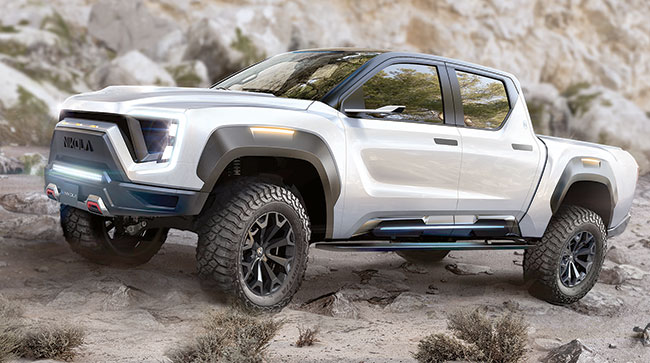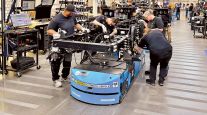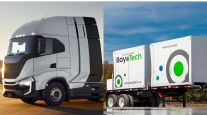Senior Reporter
Nikola, GM Strike Deal for Pickup Trucks, Batteries

[Stay on top of transportation news: Get TTNews in your inbox.]
General Motors Co. and Nikola Corp. on Sept. 8 announced a strategic partnership under which GM will build Nikola’s Badger pickup truck and also serve as a key supplier of fuel cell-electric technology for Nikola’s Class 7 and Class 8 trucks.
Under the deal, GM will receive an 11% ownership share of Nikola, a stake valued at $2 billion, and also will have a seat on Nikola’s board, the companies announced.
GM also will be the exclusive global supplier of fuel cells for Nikola Class 7-8 trucks in markets outside of Europe. Nikola will utilize General Motors’ Ultium battery system and Hydrotec fuel cell technology across its lineup, which includes the Nikola One, Two and Tre heavy-duty trucks, as well as the NZT off-road vehicle.

The Badger. (Nikola Corp.)
For the Badger, GM will handle engineering, validation and manufacturing for electric and fuel cell versions of the truck. Nikola will handle sales and marketing of the pickup, the launch of which has been pushed one year to 2022.
Nikola said the agreement will save it more than $4 billion in battery and powertrain costs during a 10-year period, and more than $1 billion in engineering and validation costs.
Nikola Executive Chairman Trevor Milton and GM CEO Mary Barra discussed the deal during a Sept. 8 video conference.

Transport Topics introduces its newest digital interview series, Newsmakers, aimed at helping leaders in trucking and freight transportation navigate turbulent times. Audience members will gain access to the industry's leading expert in their particular field and the thoughtful moderation of a Transport Topics journalist. Our second episode — "The Evolution of Electric Trucks" — featured Nikola founder and executive chairman Trevor Milton. To view the replay, complete this form.
“I don’t know that you could pick a better partner than GM in the world on this,” Milton said. “I think it’s going to be great working together with GM. They bring so much to the table for us. When you combine the two together, you get the best of both worlds.”
“We’re really excited, too,” Barra added. “We can always learn, and we see this as another great opportunity to learn from a startup, and move fast and look for new ideas and technologies. This is a great partnership where we’re both going to benefit, and great ideas are going to come from both of our teams.”
In a statement, Milton noted the benefits of aligning his startup with an established company like GM. “By joining together, we get access to their validated parts for all of our programs,” he said. “Nikola immediately gets decades of supplier and manufacturing knowledge, validated and tested production-ready EV propulsion, world-class engineering and investor confidence.”
Barra noted that the deal extends GM’s exposure to the commercial market.
“Applying General Motors’ electrified technology solutions to the heavy-duty class of commercial vehicles is another important step in fulfilling our vision of a zero-emissions future,” she said. “This does validate our technology.” She added, “We are growing our presence in multiple high-volume EV segments while building scale to lower battery and fuel cell costs and increase profitability.”
Nikola also has been focused on its financial picture of late; on June 3, it went public through a merger with VectoIQ Acquisition Corp., a special-purpose acquisition company. On July 23, Nikola broke ground on a manufacturing facility on 400 acres in Coolidge, Ariz., where it expects to begin limited truck production in late 2021 and full production in 2023.
On Aug. 10, Nikola announced it received a minimum order for 2,500 heavy-duty electrified refuse trucks from Republic Services Inc. that could expand to 5,000 over the life of the agreement. Deliveries are scheduled for 2023, with on-road testing likely to begin in early 2022.
The refuse trucks will be built on the platform of its Class 8 Tre model, according to Nikola, and the truck chassis and body will be provided directly to Republic Services from the Nikola factory. The refuse trucks are anticipated to carry up to 720 kilowatt hours of energy storage and have a range of up to 150 miles.
Want more news? Listen to today's daily briefing:
Subscribe: Apple Podcasts | Spotify | Amazon Alexa | Google Assistant | More




